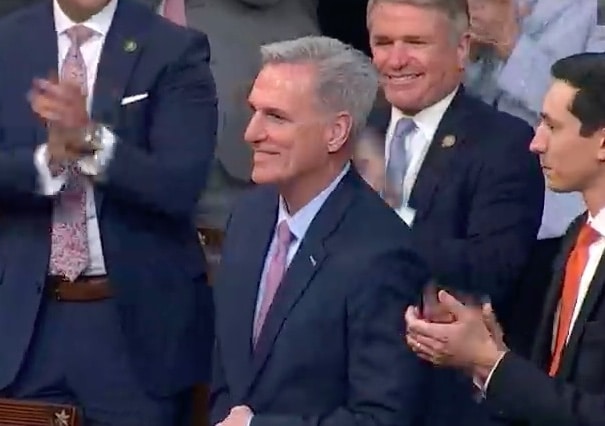Roughly a half-hour past midnight Eastern Time Saturday morning, Kevin McCarthy (R-CA) secured the votes needed to be elected Speaker of the House of the 118th Congress after a nearly historic 15th ballot.
Because six former holdouts—Reps.-elect Andy Biggs (R-AR), Lauren Boebert (R-CO), Eli Crane (R-AZ), Matt Gaetz (R-FL), Bob Good (R-VA) and Matt Rosendale (R-MT)—voted “present,” McCarthy needed only 215 ballots to achieve majority, which he surpassed by a vote.
Chanting, “One more time! One more time!” 67 Republicans voted with all 212 voted with 212 Democrats not to adjourn at roughly 11:45pm Eastern Time, sending the House directly into voting for a 15th round in four days.
Rep.-elect Bruce Westerman (R-AR) then rose to nominate McCarthy.
“The eyes of the world and the eyes of America” were watching the House, he said, adding, “What America needs and what this body needs is a lot less talk and a lot more action right now.”
Rep.-elect Dean Phillips (R-MN) then nominated Rep.-elect Hakeem Jeffries (D-NY) for Speaker. He blasted what he called “a ridiculous war for power across the aisle,” as well as the “nonsense and disfunction playing out on this floor.”
In the end, McCarthy received 216 total votes.
And for a 15th time the Democrats were unified in throwing their 212 total votes behind Jeffries.
Fifteen ballots was the fifth longest stretch of voting for House Speaker in U.S. history.
Following the election of the House Speaker, the Representatives-elect of the 118th Congress could at last be sworn in and vote on the House rules package.
However, there have been reports that moderate Republicans are less than thrilled with the concessions McCarthy made with the 20 far-right holdouts to get enough of them to flip their votes—giving more power to the Freedom Caucus while decreasing the power of the Speakership.
And there have been reports of grumbling in the ranks that members have not had enough time to review the rules package, and at least one member—Rep.-elect Tony Gonzales (R-TX)— said he would vote against it.
Top Republicans believed they could limit defections to less than five Republicans, according to CNN. But the difficulty in locking down the votes underscored how hard it would be to govern so narrowly divided a House.


